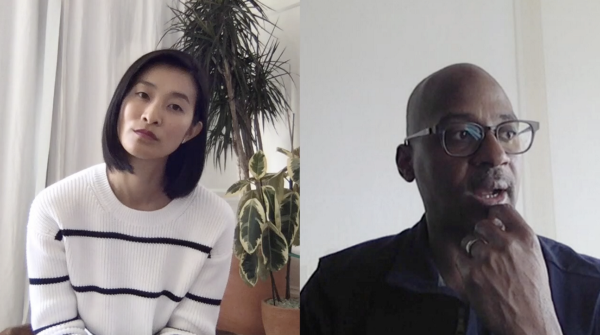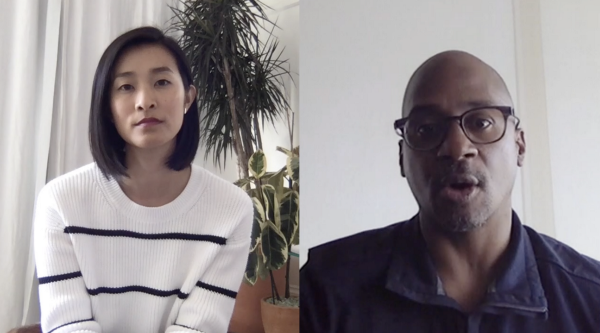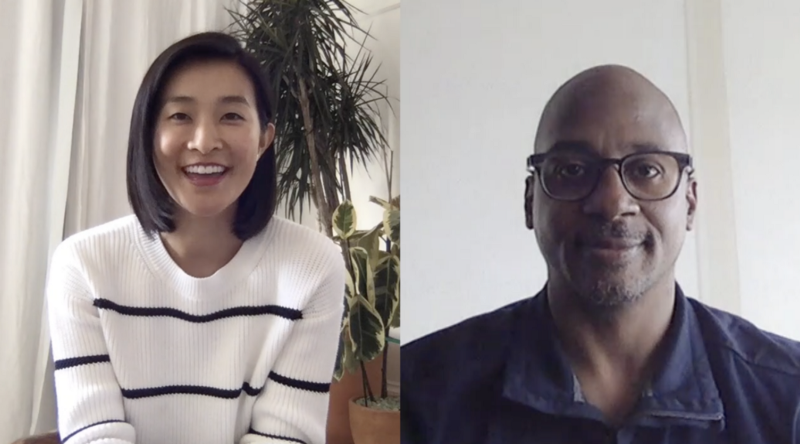As a serial entrepreneur who has been featured on CNN, USA Today, BBC, and the Wall Street Journal, Wayne talks frankly about self-awareness and depression as a leader in our interview.
Claire: Hi everyone, I’m Claire, and I’m the CEO of Know Your Company. Today, I am super excited to have with me, Wayne Sutton, who is a serial entrepreneur. He’s also the Co-founder and CTO of Change Catalyst, which hosts Tech Inclusion, this great tech conference. And he’s just in general, extremely passionate about making the tech industry more diverse and more inclusive.
I actually have never met Wayne in person. I actually read this really insightful piece that he wrote on Medium a while back about entrepreneurship, and depression, and self-awareness. It was so vulnerable, and I thought, so well done that I reached out cold and really wanted to have you on The Heartbeat.
So, Wayne, thank you for being here. I’m excited to ask you this one question about leadership.
Wayne: Thanks for having me. Thanks for reaching out, and looking forward to the conversation.
Claire: Absolutely. So, okay, Wayne, here’s the question. It’s what’s one thing you wish you would have learned earlier as a leader?

Wayne : Great question. The one thing I wish I would have learned early as a leader is self-awareness. Self-awareness about how I process my thoughts, my emotions. How and why I feel a certain way in certain interactions, in certain environments, or how did I even become self-aware to identify trigger moments, or trigger interactions with people, and what can I do to positively make change when a trigger moment happens. That could be something from my childhood, or a relationship, or another professional environment.
And also, in self-awareness, I wish I would have learned about how environments affects my productivity. How disruption, in terms of workflow, or meetings, or interactions, can increase or decrease my momentum in terms of being productive throughout the day, and what do I need to do to refuel myself.
So, if I had to sum it up, self-awareness about how to process my thoughts, my emotions, my interactions, that helps me be a better person, a better leader, a better human, and a happier individual.
Claire: Absolutely. I love that answer, Wayne, because I think self-awareness is probably the most underrated aspect of leadership. There’s not a lot of books that you read about self-awareness with leaders. You read about power and authority and decision making and strategy and growth, but not often about self-awareness. So, I love that that’s something you mentioned.
For you, when in your career did you realize how important this was. Was this something sort of very early on when you were starting to become an entrepreneur you realized right away, or was this something kind of later in your career, and only more recently where you realized the importance of self-awareness?
Wayne: It was way more later in my career. It was after when I’d hit rock bottom. like many people, you hit rock bottom.It came in a situation where I literally moved all the way across the country from North Carolina to San Francisco. I had a very young son, I was going through a separation, divorce, I had co founded an incubator and accelerator for underrepresented founders. I made a decision to leave that and now I’m in this whole new world, a lot of sacrifices, different environment. I had a very small support network in the Bay Area, not that many friends. There’s a lot of homelessness here, 90% of the homeless I think is African American, so people look like me, and I went through a stage of deep, dark depression.
I would probably say the middle or after that, I started reading books. Everything on conflict resolution, co-dependance. Books around love, books around meditation. I started getting into meditation, started a meditation practice. At first, 3 minutes, 10 minutes, 20 minutes. Along with that journey, I had to take some time off, and then through all of that, I started going to a therapist, and that therapist started helping me process all those emotions and get to some root cause of my thinking patterns and my mindset that created some a-ha moments for me. It was like, this is why I feel this way. This is why I think this way. And through all those trials, and those interactions, and sessions in therapy, and reading books, it started answering one question. And the question was why?
As I started getting to why, you become more self-aware.
Claire: Yes. First of all, I’m blown away by that level of self reflection because I think for all of us in our lives, we hit a moment of rock bottom. It’s different levels for different people, right? Of course. But there are always turning points in people’s lives, where you go, “Oh yeah, that was a dark time,” or, “Oh, that was not when I was at my best.” And I think it’s interesting the reactions people can have to that. So you can sort of bulldoze your way through it and sort of keep your habits the way you’ve always been doing things, and you just kind of find a way through it, and the path that you’re describing, Wayne, requires a lot more introspection, requires a lot more change, and self reflection.
And you said the most important question is why. I think, I guess for the leaders who are watching this, who may be saying, “Wayne, I’ve been in ut situation. I’ve been through a traumatic low-point in my life,” or, “I’m going through that right now.” What advice do you have for them to have the courage to be this introspective? ’Cause it’s scary. How did you decide to, for example, go see a therapist? How did you decide to start doing some active self work and reading books? How did you decide to start asking this question, why?
Wayne: I wanna say, first, I wouldn’t be here if it wasn’t for my family, close friends, mentors who care about, and people who I may have had one or two interactions with, who are now like my mentors and lifelong friends. So that’s one. And then, after that, the time I took off was the most helpful in that moment.
Claire: Yeah.

Wayne: I understand that I was in a privileged environment to be able to say, “All right, I can take almost a month off and disconnect from everything.” A lot of people can’t do that. But I was able to do that. It’s one of the good and bad problems about hitting rock bottom, you have nowhere to go but up. And so, took that time off, and then once I got emotionally, intellectually back on track, I was reminded of my goals. Reminded that I have a son. Reminded why I came to San Francisco. What were my objectives? What did I want to accomplish in life? And from there, it was like, with baby steps, making little small changes, say, “I can’t give up.”
That’s number one. Number two, is that … Create a plan. I had put things in motion before I took the time off that okay, I was moving into a new apartment in San Francisco, that was gonna be available when I got back, or when I was ready. I had a job offer with a startup, that was gonna be ready when I got back, if I chose. My divorce was final. I had a little bit of cash, I said, you know what, I can do this. And then with that plan, was continue with the therapist. I met with a couple in San Francisco, there’s not a lot of like … Their black population is, I think, 5%, and therapists I think is maybe 1%. I got fortunate to connect with the one black therapist, ’cause I wanted someone who can relate to my culture and identity. She was phenomenal, and to help me understand what was going on.
And so, with all that, that plan, that strategy, it helped me get to a level of action to question like, why? Why did I feel this way? Why did I think there was moment where I had to give up? Why did I make those decisions to even move out here. Like all these things helped me identify the why.
Claire: Yes.
Wayne: I hope I answered your question.
Claire: Oh, beyond. Even beyond what I was originally asking, Wayne. So many threads I wanna pull on here and highlight for people who can relate to this situation. I mean, one, you talked about the importance of a support group and a support network and a community, and I think as leaders, it’s so easy to say that we can go it on our own. That we don’t need anyone, and that we’re the leader, everyone’s looking to us when in reality, something that I love, that you talked about was no, lean on your close friends, lean on even acquaintances who’ve said that one encouraging thing to you. So, I think that’s something that’s really key.
And I think the second sort of piece I want to highlight that you mentioned, is the importance of pausing and taking a break. We rush so easily in our day to day lives, especially as leaders, to find a solution, to work at a certain pace, and that’s great. I’m all about speed and getting things done, I’m sure you are too. No one’s saying not to do that, but you said you took a month off, right? And the importance of pausing. Yeah, I’m curious, Wayne, when you wrote this blog post around self-awareness, and I’m sure as you talked to plenty of entrepreneurs and founders, what advice do you give them around being more self-aware? Is there anything that feel like you wish you would have known earlier in terms of … Or sharing with people, “These are things I wish I would have known earlier,” or, “Make sure to sort of take advantage of these things as leader,” or, “Be mindful of these things.”
Wayne: Yes, it can be challenging working with entrepreneurs who are not ready to process that. And something I wanna touch on before I answer that question, is on a comment you made about taking that time off, and being transparent, because we have made a huge mistake in the tech industry identifying role models with God complexes, type-A behavior to have all the answers. We have made a huge, human, fundamental, cultural mistake in the tech industry, ’cause that’s not how we are as humans. That’s not actually how we do business. That’s not actually how we succeed in life.
And often, you hear these stories of people, and I’m not Richard Branson, or –
Claire: Elon Musk, yeah.
Wayne: I try to use … I try not to use no more than one white male example at a time, ’cause there’s more, right?
Claire: Of course.
Wayne: There’s Rob Johnson, who’s a billion dollar African American investor. So, it’s like, there’s all these people who come out later and just talk about, “Oh,” like when they made it. And so, I just wanna touch on that, that as humans, and we talk about leadership, you don’t have to have all the answers. And I strongly believe, the more you can take time to refuel, reflect on the little wins and the losses, and be transparent about your feelings, the better you will be, and you will be able to lead.
Claire: Yes.

Wayne: So, take your time off. And so, with that, the advice I often give entrepreneurs, because many are just going. That’s how I was early in my career. I’m in my 40s now, and they’re just going. They’re trying to get money, they’re trying to raise money, they’re trying to get their product launched, they’re trying to find a CTO, they’re trying to launch a company, they’re trying to get customers, and they’re just focused on the goals. I’ve been there, you’re so focused on, I need to hit this metric, I need to get this goal, I need to meet this person who’s gonna change my life. And you’re not taking a step back to say, okay, you meet this person, but how are you feeling? What are gonna do? What happens if everybody says yes? What happens if everybody says no? How you gonna deal with that emotionally? How can you handle rejection? How do you handle success? Are you grateful for the little wins? Do you celebrate that gratefulness with your colleagues?
So, you try to break it down into simple transactional interactions that are emotional. And then you start processing that way, then it’s like, oh, I don’t know how … what happens if get told no, I don’t know if I’m told yes, and we get the deal, and everything’s perfect, I don’t know. I’m gonna be happy, yeah. But then what happens if you are told no 100 times and try to raise a million dollars, and you’re like, I’m going to succeed no matter what. Have you thought about how you handle rejection? And those type questions get to a process of becoming self-aware. Because it starts making you cognitively think about how you deal with interactions, and then it also touches on the why, because it’s like you may be angry and taking it out on a coworker, maybe upset because you didn’t reach your big vision of raising a million dollars, but what’s the why with that? You tried so hard and you were told no, no, no, no. Or when you know you deserve a raise, a salary promotion, and you see a coworker or a male get it, and you didn’t ’cause you’re a woman, and you know you deserve it. So that’s your why.
So, try to break it down to transaction interactions is how I interact with entrepreneurs to help them become self-aware, and then once they become … Get to that state where they understand well, this is why I’m not happy or I’m not succeeding, or I’m not in a good emotional state, then we’re talking about solutions.
Claire: Absolutely. I love what you’re saying about just slowing down that process for how we make those decisions instead of rushing into them, and I mean, I’ve caught myself in this often, which is you’re on autopilot. You see the goal, you know what you need to do, and it’s just a matter of sort of sprinting, or running to get there, but you know, that’s how athletes injure themselves, right? It’s when they’re not training properly or sleeping well, or understanding the mechanics of their body, or asking if they’re over stressing a certain part, right? Not to take the analogy too far, but I think turning off that auto pilot and really self reflecting is how we build that self-awareness.
Wayne, thank you so much for your incredible insights. Yeah, it’s just refreshing to have such a clear and real perspective on the psychology of being a leader, or being an entrepreneur, and not always having everything go your way all the time. ’Cause that sure is life, so thank you.
Wayne: You’re welcome, you’re welcome. And you’re right, that’s how life works.
Claire: You got it, thanks again.

